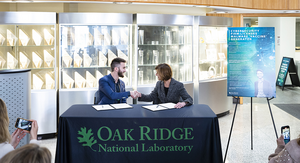ORNL’s Cyber Resilience and Intelligence Division is a global leader in cybersecurity technology, with AMIGO technology validated at a high technical readiness level. AMIGO generates optimally evasive malware using over 35 million malware samples to build a virus that can bypass existing detection technology, making it an effective tool for evaluating cybersecurity threats. The Evasive.ai platform was developed by cybersecurity firm Penguin Mustache, built on AMIGO technology, to tackle the rising threat from malware that evades traditional anti-virus systems. As open AI tools improve, attempts to penetrate security systems will increase in volume and sophistication, making the use of Evasive.ai vital to national security agencies in protecting government assets and infrastructure. The accurate commercialization of cybersecurity technology is vital to prevent adversaries from exploiting weaknesses throughout the supply chain.
The Evasive.ai platform has been licensed to cybersecurity firm Penguin Mustache to tackle the rising threat from malware that evades traditional anti-virus systems. The platform is built on technology developed by former ORNL scientist, Jared M. Smith, who created the adversarial malware input generator (AMIGO) at the request of the Department of Defense. AMIGO was designed as an evaluation tool for a challenge issued by the U.S. Naval Information Warfare Systems Command (NAVWAR) for AI applications that autonomously detect and quarantine cybersecurity threats.
Access to artificial intelligence and machine learning is transforming technology and product development, resulting in more advanced, efficient, and personalized applications by leveraging massive amounts of data. However, these same abilities are also being utilized by bad actors who use AI to create malware that evades detection by network security tools. This increasingly puts government agencies, banking institutions, critical infrastructure, and the world’s largest companies at risk.
ORNL’s deep AI expertise has led to the development of the AMIGO technology to protect the nation’s cybersecurity and economic security. The technology’s licensing to Penguin Mustache has led to the creation of the Evasive.ai platform. According to Susan Hubbard, ORNL’s deputy for science and technology, “One of ORNL’s core missions is to advance the science behind national security. This technology is the result of our deep AI expertise applied to a big challenge — protecting the nation’s cyber- and economic security.”
Jared Smith worked in ORNL’s Cyber Resilience and Intelligence Division for six years, and his business partner, Brandon Bruce, is an entrepreneur. Together, they founded Penguin Mustache and developed the Evasive.ai platform. NAVWAR, the operations unit within the Navy that focuses on secure communications and networks, utilized the AMIGO technology to evaluate AI applications that detect and quarantine cybersecurity threats.
The Cyber Resilience and Intelligence Division of Oak Ridge National Laboratory (ORNL) is a global leader in cybersecurity technology, according to Moe Khaleel, associate laboratory director for the lab’s National Security Sciences Directorate. The laboratory’s technology, the adversarial malware input generator (AMIGO), has been validated at a high technical readiness level and has been used to test commercial security tools used to protect national security.
Jared Smith, a former ORNL scientist, created AMIGO as an evaluation tool for a challenge issued by the U.S. Naval Information Warfare Systems Command (NAVWAR) for AI applications that autonomously detect and quarantine cybersecurity threats. AMIGO generates optimally evasive malware using over 35 million malware samples, some of which are publicly available and others never before seen. Smith compares the process of generating a million virus variants and a million vaccines to protect against them to vaccine development. By generating one vaccine, everyone is protected against the threat and all of its natural evolutions.
The Evasive.ai platform, developed by cybersecurity firm Penguin Mustache, is built on AMIGO technology. As bad actors increasingly use artificial intelligence to advance their attacks, the use of open AI tools will grow in volume and sophistication. The Evasive.ai platform could inform a more complete understanding of the mechanisms contributing to adversarial samples, making the next generation of machine learning defenses more robust.
Luke Koch, a former member of the AMIGO development team and currently a doctoral student and graduate research assistant in ORNL’s Cybersecurity Research Group, wrote the binary instrumentation code used in AMIGO. He notes the importance of cybersecurity commercialization in protecting against adversaries always probing for weaknesses throughout the supply chain.
The team is eager to see AMIGO integrated into Evasive.ai and implemented by national security agencies to protect government assets and infrastructure. The company’s playful name, Penguin Mustache, refers to a small mutation that enables a virus to evade existing defenses, like a penguin disguised with a mustache.
To learn more about ORNL’s intellectual property in information technology and communications, contact ORNL Partnerships or call 865-574-1051. To connect with the Evasive.ai team, complete the online form on the Evasive.ai website. The Bredesen Center program is part of the University of Tennessee Oak Ridge Innovation Institute, while UT-Battelle manages ORNL for the Department of Energy’s Office of Science, which is the single largest supporter of basic research in the physical sciences in the United States. The Office of Science is addressing some of the most pressing challenges of our time. The accuracy of news releases posted to EurekAlert by contributing institutions and the use of any information through the EurekAlert system are not the responsibility of AAAS and EurekAlert.
Don’t miss interesting posts on Famousbio









